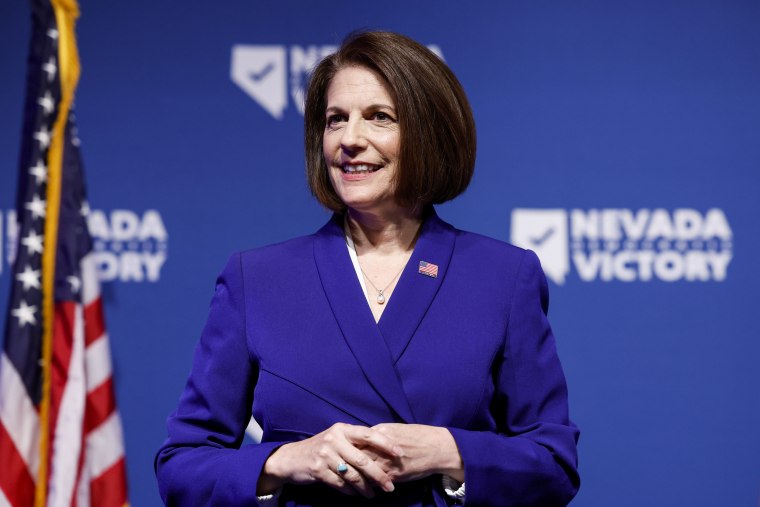SPARKS, Nev. — In a backyard on a sunny afternoon in late October, a smattering of former office holders, donors and prominent Nevada families surrounded Democratic Sen. Catherine Cortez Masto and offered their endorsements.
The significance? They were all Republicans from the swing area of Washoe County, and some supported abortion rights, just like Cortez Masto, who lost the county in 2016. But she couldn't lose it again if she were to defeat her GOP opponent, Adam Laxalt, in what would become one of the closest races in the country.
The campaign's internal data moving into the fall showed that a significant number of Nevadans still didn't know Laxalt's stance on abortion, said an adviser to Cortez Masto. That underscored a vulnerability on an issue she was certain would motivate the electorate.
As ballots came in, Cortez Masto took the lead late last week in Washoe over Laxalt, who had called the 2020 presidential election "rigged" and vowed repeatedly not to work with the other side of the aisle. Cortez Masto took the opposite tack, touting her work with Republicans like Sen. Chuck Grassley of Iowa, for instance, in one of a slew of strategic decisions, described by a campaign adviser, that led to her victory.
When the race was called late Saturday, it was the win heard around the country. Cortez Masto clinched Nevada, and that clinched control of the Senate for Democrats, overcoming historical trends that punish the party in the White House.
"When all the national pundits said I couldn’t win, I knew Nevada would prove them wrong," she said in a victory speech Sunday. "Because in Nevada, no one gets left behind — and that means standing up for our families when no one else will."
Laxalt has not yet publicly addressed the race's outcome. As of Sunday evening, Laxalt had not called Cortez Masto offering a concession, according to a source familiar with the situation. He acknowledged to supporters on Twitter Saturday that he was likely to be overtaken by Cortez Masto as mail ballots were being counted, but has not updated his Twitter since.
NBC News reached out to a Laxalt spokesperson for comment Sunday.
Cortez Masto's shoring up of Washoe was critical, but it was just one part of a strategy that flew in the faces of critics who said talking about abortion and the "big lie" weren't winning messages. Her campaign had leaned into both themes, accelerating messaging about democracy in the final weeks of the campaign.
Gas and inflation should have spelled disaster for Cortez Masto, as it did for Nevada Gov. Steve Sisolak, a Democrat who lost re-election as he took the brunt of punishment from voters for having shuttered businesses during the coronavirus pandemic. But Cortez Masto tried to inoculate herself by steering clear of President Joe Biden and tying Laxalt to big oil, which she blamed for high gas prices, at the start of the general election.
Cortez Masto, the first Latina ever elected and now re-elected to the Senate, ran ads touting ties to law enforcement to push back against a GOP crime narrative and worked her connections with the Latino community, which ultimately helped lift her to victory — even as the national narrative predicted that the demographic would trend toward the GOP.
Latinos did come out in fewer numbers than had been expected — making up an estimated 12% of the electorate, according to NBC Exit Polls, instead of the 1 in 5 voters, or 20%, who both parties estimated would turn out. Of those who did vote, 62% backed Cortez Masto. In the same exit polls, voters cited inflation first, then abortion, as the top issues for which they voted.
An organizing force that represents 60,000 hotel workers, bartenders, restaurant servers and other entertainment industry workers helped her to victory. The Culinary Union for months unleashed canvassers who visited over 1 million doors in the neighborhoods — about double the number in the 2020 presidential election — and educated voters about mail-in ballots, abortion, rent prices and immigration laws.
Laxalt did dominate the state's 15 rural counties, but there just weren't enough votes to overcome Cortez Masto in Clark and Washoe counties.
Cortez Masto and her allies also outspent Laxalt. From the onset of the general election through Election Day, Democrats sank $82.6 million into TV, radio and digital, while Republican groups spent $70.5 million, according to AdImpact, an advertising analytics firm.
Aside from those factors, Laxalt had to overcome both local and national hurdles, including the fallout from the Capitol riot and a tense intraparty battle between Nevada Republicans' rank-and-file members and those who publicly express support for Democrats.
Former Nevada GOP chair Amy Tarkanian said Sunday the reasons the Republican lost were simple: self-inflicted wounds.
"You had bullying tactics, you had the election-denying being pushed ... you had so many Republicans who could see so clearly through the lies, through the deception. It made it easy to vote for the Democrat," said Tarkanian, who was expelled from the party apparatus after she spoke out against two Republican candidates. "They only have themselves to blame."

